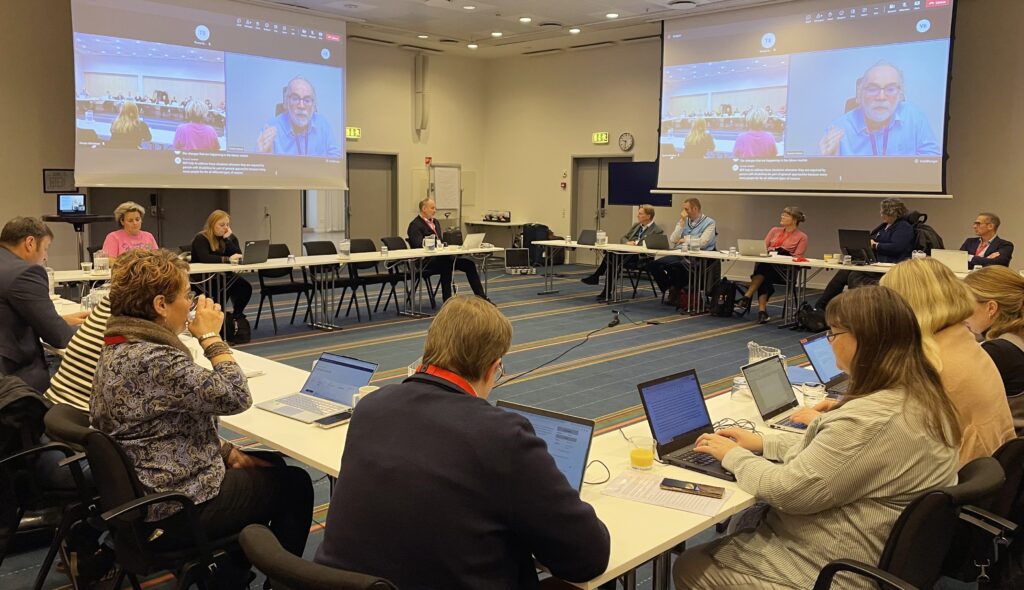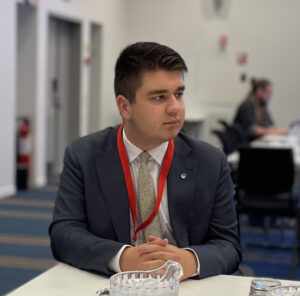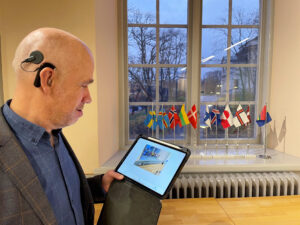New technology makes the labour market more inclusive, but several big challenges lay ahead
Vammaiskysymykset
9 marras 2023
Persons with disabilities are employed to a lesser extent than the rest of the population. At an expert seminar in Copenhagen, solutions for a more inclusive labour market were presented and discussed. New technology and more flexibility are needed, as well as more knowledge among employers and authorities.
In a global perspective, young adults with disabilities are twice as likely not to have education, employment or training compared to the rest of the population. That is particularly concerning statistics, according to the International Labour Organisation ILO.
Esteban Tromel, Senior Disability Specialist at ILO, gave the global perspective at the expert seminar in Copenhagen on 20 October 2023. Tromel presented several trends on the labour market that can increase the opportunity for people with disabilities to get jobs.
– In the future, the labour market will require much more change – reskilling, upskilling, changes of jobs. There will be more movement in and out of the labour market, for all employees. This change is interesting from a disability perspective, says Esteban Tromel.

The Covid-19 pandemic reshaped the way the world sees remote work.
– Telework, remote work, is becoming a normal solution, says Esteban Tromel, and explains that this means more opportunities to enter the labour market for people with for example mobility impairments.
Young people need more flexibility
Flexibility is key to making the labour market more inclusive for young people with disabilities. The Nordic Youth Disability Summit was held in Copenhagen prior to the labour market seminar. The participants – all leaders and representatives from youth disability organisations – presented their needs and wished for a more inclusive labour market.

– We need more flexibility. Being able to structure your own week is one way to make the labour market more inclusive, says youth representative Eiður Welding from the Icelandic Disability Alliance (ÖBÍ).
Flexibility is needed in several areas. Working hours is one, followed by flexibility when it comes to healthcare appointments. A person with disabilities can need to adjust the schedule to fit in appointments with a doctor or physiotherapist.
– Staying healthy is important to us, and ensures we can work for a long time, says Eiður Welding.
Flexibility regarding assistance is also needed.
– It can be the opportunity to bring a personal assistant to work, or to get enough assistance hours covered so we both do our job and enjoy our spare time.
The youth representatives also call for more flexibility in the balance between work and welfare benefits.
– The system is strict and not based on individual needs. In some cases, young people with disabilities will not work because the benefit system makes it uneconomical for them to take on a job, Eiður Welding sums up the youth summit discussion.
More information about rights and possibilities is needed, according to the Nordic Youth Disability Summit. Employers also need information about how to make the workplace accessible and what rights there are when employing a person with disability. Ideally, there would be contact persons who would be able to guide both employers and employees regarding the labour market and its accessibility.
Social networks more important when looking for a job
Thomas Bredgaard, professor at Aalborg University, talked about employment among people with disabilities from a Danish perspective.
– When the economy is blooming, more people with disabilities have jobs, and vice versa, says Thomas Bredgaard.
The research in Denmark shows that persons with disabilities rely more on their social networks when it comes to finding a job, compared to persons without disabilities.
Technology makes the future workplace more inclusive
New technology, digitization and innovations create more opportunities for people with disabilities to access the labour market. Senior Advisor Lars Lindberg from the Nordic Welfare Centre presented new findings, together with results from the project The future of working life – technology and digitalisation for increased inclusion.
– There is only limited research about new technologies and their impact on increasing access to working life for people with disabilites, says Lars Lindberg.

Several technologies are identified as important with potential to increase inclusion. AI is the one being most discussed at the moment, followed by apps, exoskeletons, prosthesis control, haptic interfaces, robotics, human language technology, and text-to-speech or speech-to-text technology and wearable technology. Many of the technologies are combined and also included in consumer products.
While AI is rapidly entering more and more fields in the labour market, the risks in using AI are causing concern.
– While creating enormous opportunities, AI can also both mirror and amplify the discrimination that is present elsewhere in the society, says Lars Lindberg.
The UN Special Rapporteur on the rights of persons with disabilities has urged the member states to immediately start focusing on how AI affects the rights of the approximately 1 billion people with disabilities on a global scale.
New solutions reach the labour market slowly
In the Nordic region, a majority of people with disabilities experience barriers when using information and communications technology.
– It is hard to get new technological solutions out on the market, since the systems are stiff and stick to old solutions. Both individuals and professionals struggle to get an overview of available solutions and what actually works, says Lars Lindberg.
The findings in the project indicate that there is a great need for knowledge in several different target groups. One example is getting specialists on working adaption at employment agencies. More public investment in research, innovation and competence development is also needed to increase the inclusivity of the labour market.
